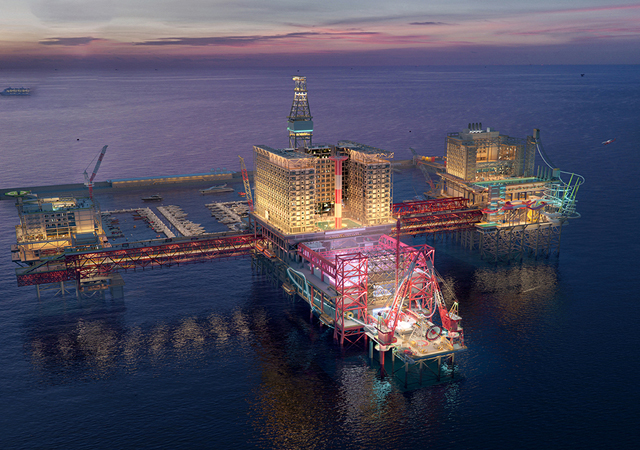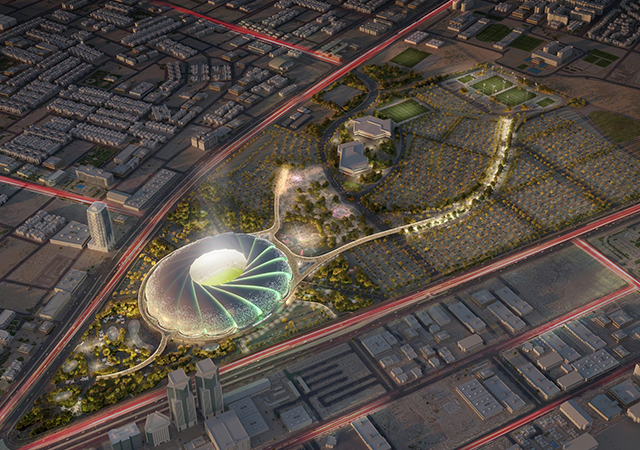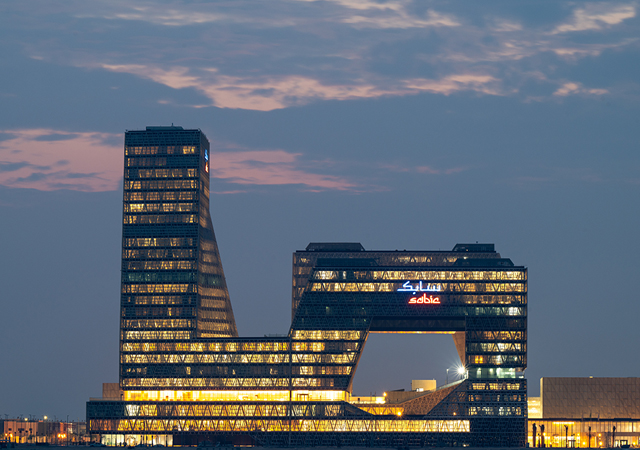.jpg)
.jpg) Aramco Stadium ... under construction in the Eastern Province.
Aramco Stadium ... under construction in the Eastern Province.
These two mega-projects represent a shift towards a more diversified and experience-driven approach to real estate development in the Eastern Province. They signal a focus on attracting international visitors, enhancing tourism infrastructure, and creating unique and memorable experiences for residents and tourists alike in line with Saudi Arabia’s Vision 2030 programme.
Furthermore, these projects will likely inspire other innovative and ambitious real estate ventures in the region to cater to the anticipated growth in tourist numbers. These include the SR1.4-billion ($372.5 million) Half Moon Beach Resort, a luxury development funded by the Tourism Development Fund, and the SR6-billion Heart of Khobar project – launched by Tilal Real Estates late last year – which aims to create a sustainable and pedestrian-friendly urban environment.
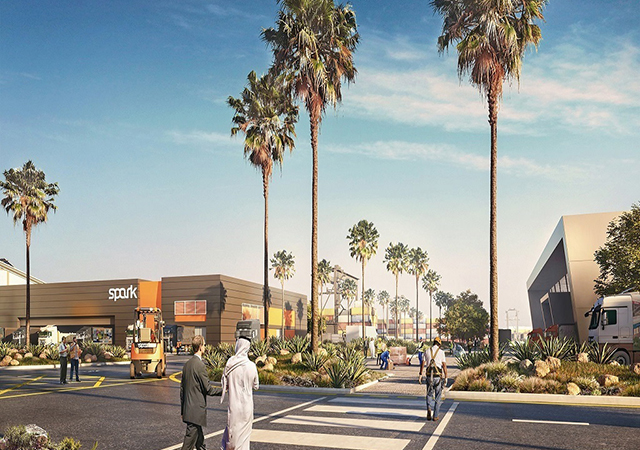 |
|
King Salman Energy Park (Spark) continues to attract significant investment. |
Apart from real estate and tourism, industrial growth has been a focal aspect of Saudi Arabia’s efforts to diversify its economy. The pioneering Jubail Industrial City, which has continuously expanded, and the mega King Salman Energy Park (Spark) and Ras Al Khair – which were launched more recently – are all attracting global interest and investment.
Meanwhile, the Eastern Province – the fount of Saudi Arabia’s hydrocarbons wealth – continues to invest in its oil and gas infrastructure, with some of the latest contracts awarded by Saudi Aramco worth some $25 billion to push ahead with its strategic gas expansion.
Airports
The airports in the Eastern Province, particularly King Fahd International Airport (KFIA), are set for a revamp as Saudi Arabia keenly pushes its tourism drive.
Dammam Airports Company (DACO) recently appointed Hill International to provide project management consultancy services for multiple improvement projects at its key projects, including King Fahd International, Al Ahsa International and Al Qaisumah International (AQI) airports.
Located in Dammam, KFIA is one of the kingdom’s four primary international airports that can handle more than 10 million passengers annually. Under the three-year award, Hill will oversee ongoing and upcoming projects at the airport, including asset replacements and upgrades, IT enhancements, and other landside and airside assignments.
Hill’s PMC scope encompasses working with DACO on project management, construction management, project development and planning, quality management, digital transformation, IT operations, and design review services for 105 ongoing and upcoming projects. These projects include new construction, rehabilitation and asset replacements, upgrades, design studies and asset assessments, and asset management.
Power & Water
In line with Saudi Arabia’s diversification efforts which are seeing a surge in industrial, tourism and real estate investment, the kingdom is boosting its utilities sector and is now actively seeking private sector participation in its power and water projects, including renewables such as solar energy.
Saudi Arabia’s National Center for Privatization & Public Private Partnership (NCP) is developing a power plant in the Empty Quarter – Rub’al Khali (EQ- Power Project) and has prequalified consortiums of four regional utility developers for the project. These are groups of the Saudi-based Alfanar and Olayan Energy; UAE’s Siraj Power for Renewable Energy; and Bahrain’s Lamar Holding, a key developer of large-scale public-private partnership (PPP) projects across oil and gas and energy transition in the GCC.
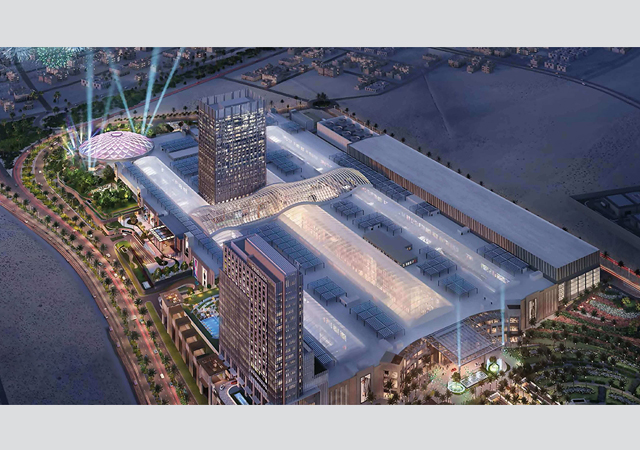 |
|
Construction work in under way on The Avenues–Khobar, a SR7.3 billion mixed-use development. |
The project is being developed by NCP in collaboration with the kingdom’s Zakat, Tax, and Customs Authority (Zatca) and is being implemented on the design, build, finance, operate, maintain and transfer model. The duration of the project will cover the construction period and 25 years of operations and maintenance.
Meanwhile, Saudi Power Procurement Company (SPPC) has announced consortiums led by global utility majors – International Company for Water and Power Projects (Acwa Power) and Abu Dhabi National Energy Company (Taqa) as winning bidders for the Al Nairyah I and II power projects, respectively, with a total capacity of 3,600 MW.
Unveiling the winning bidders, SPCC said a consortium of Saudi Electricity Company (SEC), Acwa Power and Korea Electric Power Corporation (Kepco) has been awarded the contract for the 1.8 GW Nairyah I power plant, while a consortium of Taqa, Japanese power generation company Jera and top Saudi contractor Al Bawani has secured the contract for the 1.8 GW Nairyah II power plants. These plants will operate using natural gas combined cycle technology with provision for carbon capture unit readiness.
In the renewables sector, SPPC has shortlisted bidders for the 2000MWac capacity Al Sadawi IPP in the Eastern Province, as part of the National Renewable Energy Program’s (NREP) Round 5 Solar Projects.
Among the largest projects in the water sector is the Jubail 4 and Jubail 6 Independent Water Plant (IWP). Saudi Water Partnerships Company (SWPC), which is spearheading the project, has announced that a consortium led by Acwa Power with key partners – Haji Abdullah Alireza & Partners Company and AlSharif Contracting and Commercial Development – has emerged as the preferred bidder for the IWP, which boasts a potable water production capacity of 600,000 cu m per day. The winning consortium will develop and operate the plant for a duration of 25 years starting from the facility’s commercial operation date, which has been set for Q1 2028.
The desalination plant will be located 18 km south of Jubail Industrial City, adjacent to the existing plant units (Jubail Phase 1, Jubail Phase 2, Jubail 3A and 3B), in the Eastern Province.
The SR2.6-billion Jubail 3B IWP project – which was developed by a consortium led by French energy giant Engie with prominent local firms Nesma Company and Alajlan Company – began commercial operations in August last year. A state-of-the-art facility, it employs reverse osmosis technology to produce 570,000 cu m of potable water per day, catering to the needs of two million residents in Riyadh and Qassim.
SWPC has also invited local and international developers to participate in the prequalification process to set up its future projects in the sectors of water production plants and sewage treatment plants, including the Ras Al Khair 2 and 3 IWP, which will boast a total capacity of 1 million cu m; and Hafr Al-Batin ISTP and Al Kharj ISTP.
SWPC is also implementing the 587-km Jubail-Buraydah Independent Water Transmission Pipeline (IWTP) project, on a build, own, operate and transfer (BOOT) basis. The commercial operations for the project are expected to begin in Q1 2029.
Oil & Gas
Saudi oil giant Aramco has awarded contracts worth more than $25 billion to progress its strategic gas expansion, which targets sales gas production growth of more than 60 per cent by 2030, compared to 2021 levels.
The scope of work includes Phase Two development of the vast Jafurah unconventional gas field as well as Phase Three expansion of Aramco’s Master Gas System, new gas rigs and ongoing capacity maintenance. It also involves construction of gas compression facilities and associated pipelines and the expansion of the Jafurah Gas Plant – including construction of gas processing trains, and utilities, sulfur and export facilities, it stated.
According to Aramco, Phase One of the Jafurah development programme, which commenced in November 2021, is progressing as per schedule with initial start-up scheduled during Q3 of 2025.
Aramco expects total overall lifecycle investment at Jafurah to exceed $100 billion and production to reach a sustainable sales gas rate of two billion standard cu ft per day by 2030, in addition to significant volumes of ethane, NGL and condensate.
The company has awarded 16 contracts, worth a combined total of around $12.4 billion, for Phase Two development at Jafurah. The work will involve construction of gas compression facilities and associated pipelines, expansion of the Jafurah Gas Plant.
It will also involve construction of the company’s new Riyas Natural Gas Liquids (NGL) fractionation facilities in Jubail – including NGL fractionation trains, and utilities, storage and export facilities – to process NGL received from Jafurah.
According to Aramco, another 15 lumpsum turnkey contracts, worth a combined total of around $8.8 billion, have been awarded to commence Phase Three expansion of the Master Gas System, which delivers natural gas to customers across Saudi Arabia. The Master Gas System is an extensive network of pipelines that connects Aramco’s key gas production and processing sites throughout the kingdom.
The expansion, being conducted in collaboration with the Ministry of Energy, will increase the size of the network and raise its total capacity by an additional 3.15 billion standard cu ft per day by 2028, through the installation of around 4,000 km of pipelines and 17 new gas compression trains.
Last April, Samsung E&A, a leading engineering solutions and project management company, secured contracts worth $6 billion for Aramco’s Fadhili Gas Increment Program. As per the deal, Samsung E&A will execute Package One Gas Treatment Unit as well as Package Four Utilities and Offsites. Once the project is completed, the daily gas throughput will increase from the existing 2.5 billion cu ft to 3.8 billion cu ft.
Samsung E&A said it will independently carry out the entire engineering, procurement and construction process.
Meanwhile, Saipem, a leading engineering and construction company, has recently been awarded a offshore contract worth $2 billion, under the existing Long-Term Agreement (LTA) with Saudi Aramco, for the development of the Marjan field.
The fabrication activities will be executed at the Saudi fabrication yard Saipem Taqa Al Rushaid Fabricators Company (Stat), located in Dammam, further enhancing the local content and developing the capabilities of the local industry, said the company.
Industry
Propelling Saudi Arabia’s industrial ambitions in the Eastern Province are the well established Jubail Industrial City, and the more recent King Salman Energy Park (Spark), the Ras Al-Khair Industrial City and King Salman Global Maritime Industries Complex.
Among the biggest ventures on the anvil is a $4.5-billion low-carbon steel plant planned by leading Indian business conglomerate Essar Group. Work on the project is expected to start after receiving all the government approvals and is expected to take three-and-a-half years to build. Essar has already acquired a 1,000-acre land parcel in Ras Al-Khair.
Essar also plans to invest in constructing two dedicated berths at Ras Al Khair port, exclusively for its steel project.
Meanwhile, Spark continues to win global interest, with its latest successes including new projects involving a total investment of SR3 billion signed off at Adipec 2024 in November. Among the global firms that have signed up to build factories are MAN Industries and Thermocables (both from India) and Hong Kong-based Dalipal Holdings, which will set up steel pipes and cable manufacturing facilities within the mega industrial development in the Eastern Province.
In addition to these three, leading entities BioChem, a chemical manufacturing company and Saudi-based Primetech were also among the deals signed by Spark.
Spark has indicated that total tenant investment in the park has exceeded $3 billion.
Its subsidiary Spark Utilities has just signed a partnership with GCC Lab to provide technical and construction services within the energy park, connecting tenants to utility networks and ensuring reliable access to electricity and water services.
Other manufacturing facilities taking shape include the new Al Asasyah Advanced Industry HVAC Smart Factory, which will manufacture smart air-conditioners with VRF (variable refrigerant flow) technology, integrated with photovoltaic energy production technology. The factory is being set up by Saudi-based Basic Electronics Company in a tie-up with Chinese electric appliances group Gree.
Housing
The housing sector in the Eastern Province is witnessing significant activity driven by the need to provide homes for citizens as well as staff housing for industry majors such as Saudi Aramco and Sabic. Recent developments include the awarding of an EPC contract to Top Engineering/Shaanxi Construction Corporation for the construction of state-of-the-art residential facilities for Aramco staff in Haradh and Wudaihi.
PIF-owned Roshn, Saudi Arabia’s national community developer with a mandate to create exceptional neighbourhoods, in March launched Aldanah, its second integrated community in the Eastern Province and first in Dhahran. Covering over 1.7 million sq m, Aldanah will eventually be home to nearly 10,000 inhabitants.
Aldanah will feature thoughtfully placed amenities that provide residents with the convenience that has become Roshn’s signature, with a city experience centre, a district mall, three neighbourhood retail centres, a primary healthcare centre, mosques, and six schools dotted throughout walkable neighbourhoods.
Building Construction Company (BCC), a subsidiary of Retal Urban Development Company has secured a SR2.89-billion contract from Roshn to build 1,962 homes at Aldanah.
Roshn is also developing Alfulwa, which will cover an area of more than 10.8 million sq m, some 7 km from the centre of Al Ahsa Governorate.
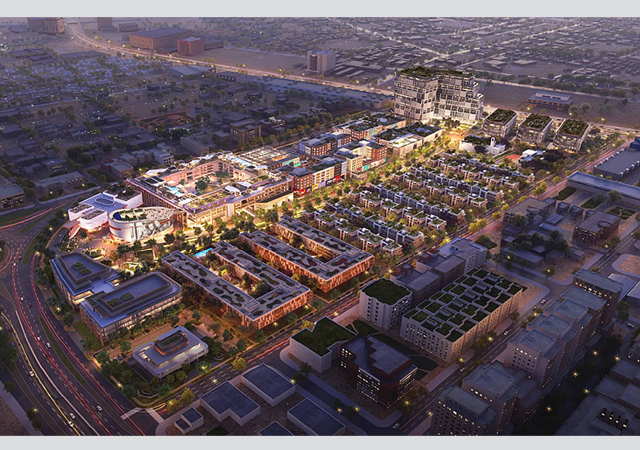 |
|
The SR6-billion Heart of Khobar ... a project by Tilal Real Estates. |
Real Estate
The real estate sector in the Eastern Province is experiencing a period of significant growth and transformation, with the focus being on tourism and hospitality, the development of integrated mixed-use communities, and an emphasis on enhancing quality of life. Government initiatives, such as Vision 2030, are driving these developments by encouraging private sector investment and promoting economic diversification.
Several major projects are under way in the Dammam-Al Khobar area, including the SR1.4 billion Half Moon Beach Resort, a luxury development aimed at enhancing tourism offerings and the SR6-billion Heart of Khobar project by Tilal Real Estates which aims to create a sustainable and pedestrian-friendly urban environment with a mix of residential, commercial, and recreational spaces.
Spanning a 262,000-sq-m area, the project at Half Moon Bay is funded by Saudi Arabia’s Tourism Development Fund (TDF) and will be operated under the Rixos brand by global hospitality leader Accor. On completion, it will boast 400 hotel rooms and 41 residential villas in addition to a variety of restaurants, cafés and entertainment facilities, thus positioning it as the first all-inclusive coastal resort in the Eastern Province.
Construction is also progressing on The Avenues–Khobar, a SR7.3 billion mixed-use development featuring shopping, dining, entertainment, and luxury hotels. Located at the intersection of King Saud Road with Prince Sultan Road, The Avenues – Khobar boasts a gross leasable area (GLA) of 167,000 sq m, accommodating shopping, dining, entertainment and office spaces. The project will feature over 10 cinema halls, numerous cafes and restaurants, public gardens, entertainment venues and more than 6,000 parking spaces.
Among other projects, Adel Real Estate has unveiled plans for Adel District, a 5.6-million-sq-m plot-based urban development in Dammam that will include five residential neighborhoods that can accommodate 50,000 people, office spaces, and extensive green areas.








.jpg)




.jpg)




























.jpg)

































